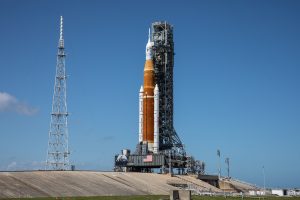
On August 29, the Kennedy Space Center will launch a test flight of Artemis I, the first capsule designed to take humans to the moon since the Apollo program in the 1960s. But much has changed since the Apollo program, which was motivated by a political interest to land on the moon before Soviet Russia.
“Are we there yet?” a WMFE podcast exploring space exploration, interviewed UCF associate professor of history Amy Foster about the differences between the United States’ first moon mission and Artemis I.
“The whole tenor of the mission is flip-flopped from what we see in the 1960’s,” Foster said. “Science was secondary with Apollo, and it is primary with Artemis.”
Foster also discusses NASA’s future vision for Artemis I.
“The whole mission is designed to return us to the moon, gather more scientific data and samples, but also to learn how to live in space,” Foster said. “Being able to colonize in space is a big part of what Artemis is about.”
Click here to hear the full story from WMFE.